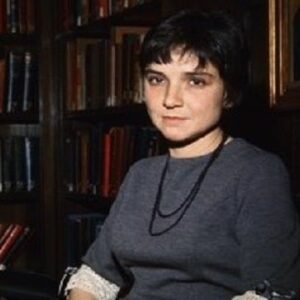Adrienne Rich was a poet, essayist, and feminist from the United States. She was born to parents who were Jewish and Protestant. From an early age, her father encouraged her to read and write and tutored her at home. She spent a lot of time in her father’s library, which was brimming with the works of great authors. She worked diligently to fulfill her father’s wishes and published her first collection of poems, ‘A Change of World,’ at the age of twenty-two. She married Economics Professor Alfred Conrad and had three sons. Their marriage deteriorated significantly as a result of her lesbian status. They divorced, and Conrad took his own life. A significant portion of her work dealt with her views on lesbianism and feminist activism. Her poems and essays were well-received, and she received a number of awards and accolades from a variety of sources. ‘The Diamond Cutters’, ‘Snapshots of a Daughter-in-Law’, ‘Twenty-One Love Poems’, ‘A Wild Patience Has Taken Me This Far’, and ‘The Fact of a Doorframe’ are among her poetry collections. ‘The Art of the Possible: Essays and Conversations’ and ‘Compulsory Heterosexuality and Lesbian Existence’ are among her critically acclaimed essays.
Childhood & Adolescence
Adrienne Cecile Rich was born in Baltimore, Maryland, to Arnold Rice Rich, Chairman of Pathology at Johns Hopkins Medical School, and Helen Elizabeth Jones Rich, a concert pianist and composer.
She was educated at home until fourth grade, when she began attending school. Later in life, she attended Roland Park Country School. She received her undergraduate degree from Radcliffe College, Harvard.
Her poems ‘Sources’ and ‘After Dark’ discuss her relationship with her father and the sacrifices she made to help her parents achieve their goals.
Career of Adrienne Rich
She relocated to New York with her husband and children in 1966. She became involved in anti-war, civil rights, and feminist activism during this time period. Her husband accepted a position as a professor at City College.
8Beginning in 1967, she lectured at Swarthmore College for two years. As an assistant professor, she taught in Columbia University’s School of the Arts’ Writing Division.
In 1968, she signed the ‘Writers and Editors War Tax Protest,’ pledging not to pay taxes in protest of the Vietnam-American War. Her writings reflected her outspoken political views.
In 1968, she began teaching in City College of New York’s SEEK program. She wrote poems such as ‘Necessities of Life’, ‘Leaflets’, and ‘The Will to Change’ during this time period.
Adrienne Rich compiled and republished several of her essays in 1979, titled ‘On Lies, Secrets, and Silence: Selected Prose,’ in which she argued for the importance of sexual equality.
In 1979, Smith College bestowed upon her an honorary doctorate. She then relocated to Montague, MA, with her partner, Michelle Cliff, and then to Santa Cruz, where Rich pursued her teaching and writing careers.
She lectured at Scripps College, San Jose State University, Stanford University, and Cornell University in the 1980s and authored ‘Your Native Land, Your Life,’ ‘Blood, Bread, and Poetry,’ and ‘Time’s Power: Poems 1985–1988.
8
Her efforts culminated in the establishment of ‘Bridges: A Journal for Jewish Feminists and Our Friends’ in 1990. She served as editor of the journal and championed the cause of Jewish women’s rights.
‘Midnight Salvage: Poems 1995–1998’, ‘The Art of the Possible: Essays and Conversations’, and ‘Fox: Poems 1998–2000’ were among her works during the 1990s.
Significant Works of Adrienne Rich
Adrienne Rich published her first collection of poetry, ‘A Change of World,’ in 1951. It was chosen for the Yale Series of Younger Poets Award by renowned poet W.H. Auden, who also wrote the introduction.
‘The Diamond Cutters,’ her second collection of poems, was published to critical acclaim in 1955. After her marriage, she wrote her third collection, ‘Snapshots of a Daughter-in-Law,’ in which she expressed her struggle and turmoil as a wife and mother.
Her lesbian views were expressed in her poems ‘Twenty-One Love Poems,’ ‘A Wild Patience Has Taken Me This Far,’ and ‘The Fact of a Doorframe.’ Additionally, she authored the widely acclaimed essay ‘Compulsory Heterosexuality and Lesbian Existence’.
Awards and Accomplishments
Rich won the 1974 National Book Award for Poetry for his poem ‘Diving into the Wreck.’
She was the recipient of the ‘Ruth Paul Lilly Poetry Prize,’ the ‘Elmer Holmes Bobst Award in Arts and Letters from New York University, and the ‘National Poetry Association Award for Distinguished Service to the Art of Poetry.
Her 1991 collection of poetry, ‘An Atlas of the Difficult World,’ won the ‘Los Angeles Times Book Award in Poetry,’ the ‘Lenore Marshall/Nation Award,’ the ‘Poet’s Prize,’ and the ‘Commonwealth Award in Literature.
Personal History and Legacies
Adrienne Rich married Alfred Haskell Conrad, a Harvard University Economics Professor, in 1953. They established themselves in Cambridge, Massachusetts. They were the parents of three sons: David, Paul, and Jacob.
By 1970, her marriage had deteriorated significantly. Conrad began to believe she was insane. They divorced in the mid-1970s. Conrad drove into the woods and shot himself in October.
In 1976, Rich began a lifelong lesbian relationship with Michelle Cliff, a Jamaican novelist and editor. Her relationship served as the foundation for her contentious book, ‘Of Woman Born: Motherhood as Experience and Institution’.
Adrienne Rich died at her home in Santa Cruz, California. Her sons, grandchildren, and partner, Michelle Cliff, survive her.
Estimated Net Worth
Adrienne is one of the wealthiest poets and is listed on the list of the most popular poets. Adrienne Rich’s net worth is estimated to be around $1.5 million, based on our analysis of Wikipedia, Forbes, and Business Insider.
Trivia
This eminent author declined to accept the National Medal of Arts in protest of the House of Representatives’ 1997 vote to eliminate the National Endowment for the Arts.
This illustrious poet declined President Bush’s invitation to a poetry event at the White House in 2003 in protest of the Iraq war.


